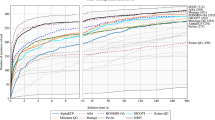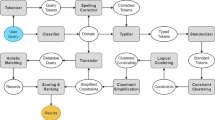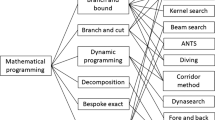Abstract
This paper presents a hybrid symbolic-numeric algorithm to compute ranking functions for establishing the termination of loop programs with polynomial guards and polynomial assignments. The authors first transform the problem into a parameterized polynomial optimization problem, and obtain a numerical ranking function using polynomial sum-of-squares relaxation via semidefinite programming (SDP). A rational vector recovery algorithm is deployed to recover a rational polynomial from the numerical ranking function, and some symbolic computation techniques are used to certify that this polynomial is an exact ranking function of the loop programs. At last, the authors demonstrate on some polynomial loop programs from the literature that our algorithm successfully yields nonlinear ranking functions with rational coefficients.
Similar content being viewed by others
References
Turing A, On computable numbers, with an application to the entscheidungsproblem, Proc. of the London Mathematical Society, 1937, S2-42(1): 230–265.
Tiwari A, Termination of linear programs, Computer Aided Verification (ed. by Alur R and Peled D), Springer-Verlag, Lecture Notes in Computer Science, 2004, 3114: 70–82.
Braverman M, Termination of integer linear programs, Computer Aided Verification (ed. by Ball T and Jones R B), Springer-Verlag, Lecture Notes in Computer Science, 2006, 4144: 372–385.
Bradley A R, Manna Z, and Sipma H B, Termination of polynomial programs, Verification, Model Checking, and Abstract Interpretation (ed. by Cousot R), Springer, Lecture Notes in Computer Science, 2005, 3385: 113–129.
Babic D, Hu A J, Rakamaric Z, and Cook B, Proving termination by divergence: Software engineering and formal methods, IEEE, 2007, 93–102.
Colón M and Sipma H B, Synthesis of linear ranking functions, Tools and Algorithms for the Construction and Analysis of Systems (ed. by Margaria T and Yi W), Springer-Verlag, Lecture Notes in Computer Science, 2001, 2031: 67–81.
Colón M and Sipma H B, Practical methods for proving program termination, Computer Aided Verification (ed. by Brinksma E and Larsen K G), Springer-Verlag, Lecture Notes in Computer Science, 2002, 2404: 442–454.
Podelski A and Rybalchenko A, A complete method for the synthesis of linear ranking functions, Verification, Model Checking, and Abstract Interpretation (ed. by Steffen B and Levi G), Springer, Lecture Notes in Computer Science, 2004, 2937: 239–251.
Bradley A R, Manna Z, and Sipma H B, Termination analysis of integer linear loops, Concurrency Theory, 16th International Conference, Springer-Verlag, Lecture Notes in Computer Science, 2005, 3653: 488–502.
Chen Y, Xia B, Yang L, Zhan N, and Zhou C, Discovering non-linear ranking functions by solving semi-algebraic systems, Theoretical Aspects of Computing, Springer-Verlag, Lecture Notes in Computer Science, 2007, 4711: 34–49.
Yang L, Zhou C, Zhan N, and Xia B, Recent advances in program verification through computer algebra, Frontiers of Computer Science in China, 2010, 4(1): 1–16.
Cousot P, Proving program invariance and termination by parametric abstraction, lagrangian relaxation and semidefinite programming, Verification, Model Checking, and Abstract Interpretation, Springer-Verlag, Lecture Notes in Computer Science, 2005, 3385: 1–24.
Xia B, Discoverer: A tool for solving semi-algebraic systems, ACM Commun. Comput. Algebra, 2007, 41(3): 102–103.
Safey M, Raglib (real algebraic library maple package), available at http://www-calfor.lip6.fr/~safey/RAGLib, 2003.
Nie J and Schweighofer M, On the complexity of putinar’s positivstellensatz, Journal of Complexity, 2007, 23(1): 135–150.
Putinar M, Positive polynomials on compact semi-algebraic sets, Indiana Univ. Math. J., 1993, 42(3): 968–984.
Prajna S, Papachristodoulou A, Seiler P, and Parrilo P A, SOSTOOLS: Sum of squares optimization toolbox for Matlab, 2004.
Löfberg J, Yalmip: A toolbox for modeling and optimization in Matlab, Proceedings of the CACSD, Taipei, Taiwan, 2004, available at http://control.ee.ethz.ch/~joloef/yalmip.php.
Sturm J F, Using SeDuMi 1.02, a Matlab toolbox for optimization over symmetric cones, Optimization Methods and Software, 1999, 11(1): 625–653.
Kaltofen E, Li B, Yang Z, and Zhi L, Exact certification in global polynomial optimization via sums-of-squares of rational functions with rational coefficients, Journal of Symbolic Computation, 2012, 47(1): 1–15.
Lagarias J C, The computational complexity of simultaneous diophantine approximation problems, SIAM J. Comp., 1985, 14(1): 196–209.
Author information
Authors and Affiliations
Corresponding author
Additional information
This research was supported in part by the National Natural Science Foundation of China under Grant Nos.10901055, 61021004, 91118007, by NKBRPC 2011CB302802, 2011CB706901, and by the Fundamental Research Funds for the Central Universities under Grant No. 78210043.
This paper was recommended for publication by Editor DAI Yuhong.
Rights and permissions
About this article
Cite this article
Shen, L., Wu, M., Yang, Z. et al. Generating exact nonlinear ranking functions by symbolic-numeric hybrid method. J Syst Sci Complex 26, 291–301 (2013). https://doi.org/10.1007/s11424-013-1004-1
Received:
Revised:
Published:
Issue Date:
DOI: https://doi.org/10.1007/s11424-013-1004-1




